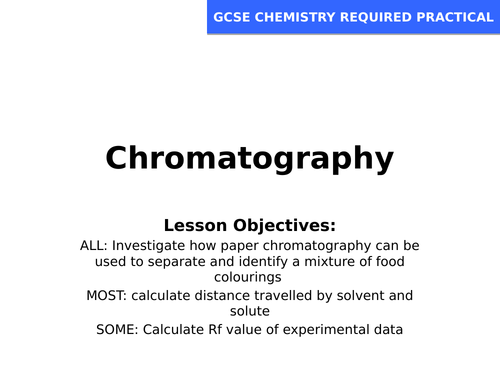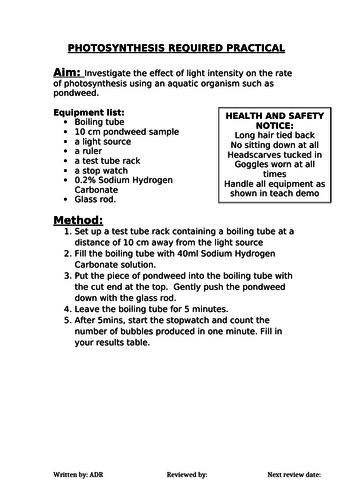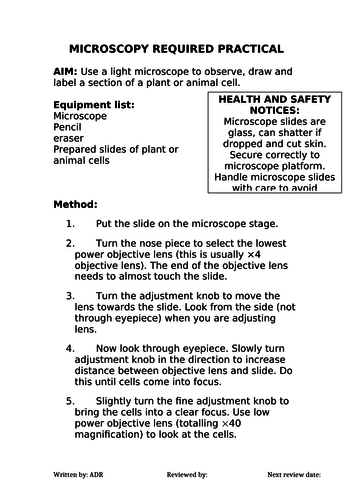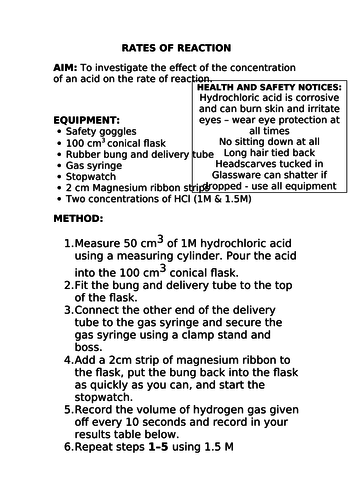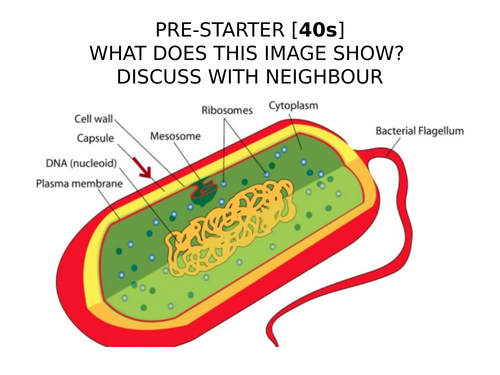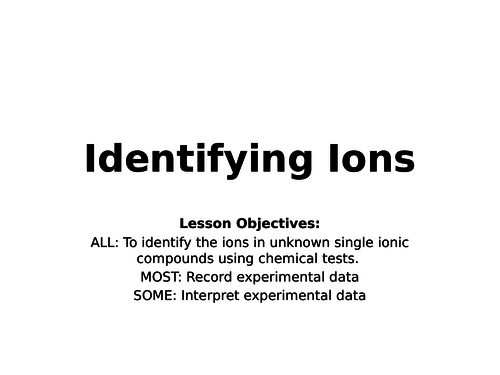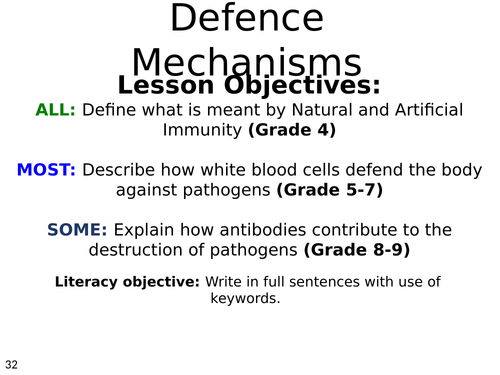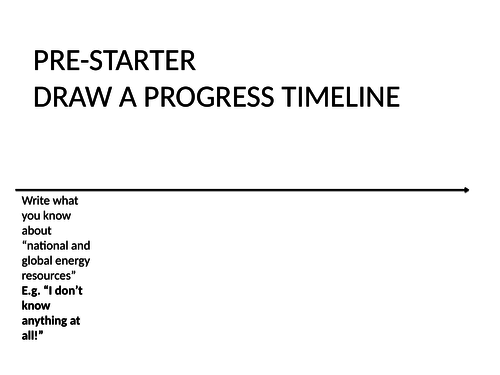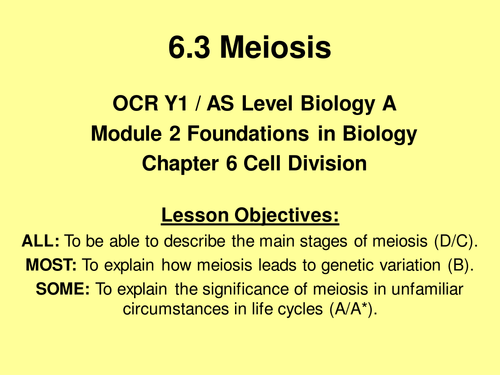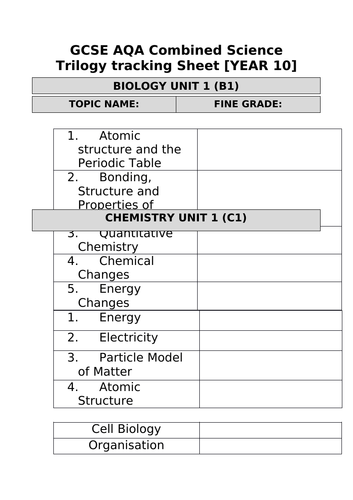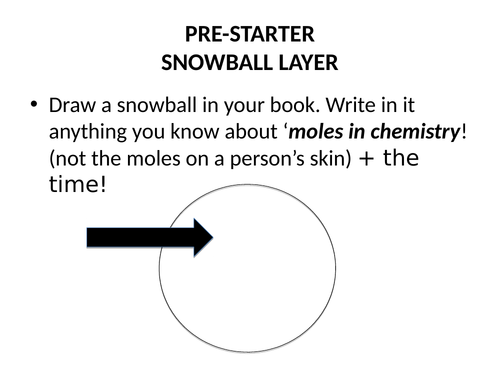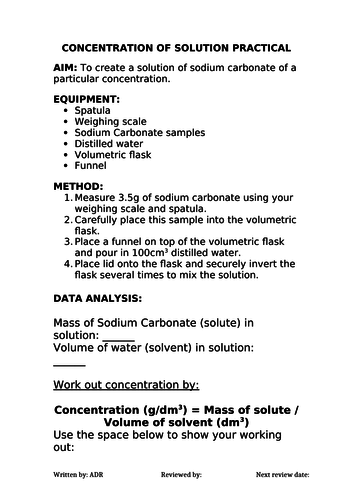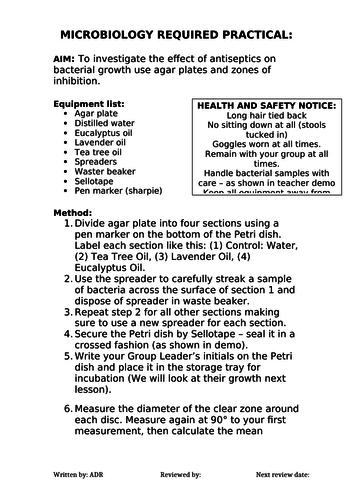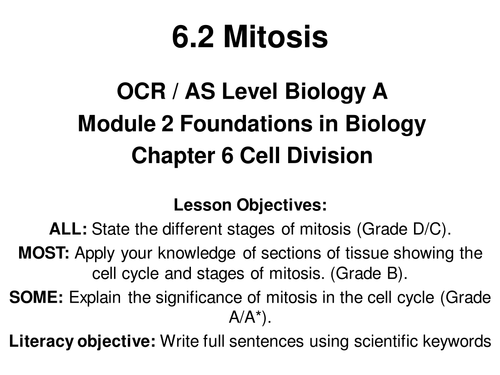172Uploads
30k+Views
2k+Downloads
Featured resources

2018 AQA GCSE Chemistry Unit 2 (C2): Chromatography Required Practical
This unique and high-quality pack contains all resources needed to deliver the Chromatography Required Practical for the new 2018 AQA GCSE Chemistry and AQA GCSE Combined Science: Trilogy specifications.

2018 AQA GCSE Biology Unit 1 (B1): Photosynthesis Required Practical
This pack contains all resources needed to deliver the Photosynthesis Required Practical for the new 2018 AQA GCSE Biology specification.

2018 AQA GCSE Biology Unit 1 (B1): Microscopy Required Practical
This pack contains all resources needed to deliver the Microscopy Required Practical for AQA GCSE Biology and Combined Science: Trilogy for the new 2018 AQA GCSE science specifications.

2018 AQA GCSE Chemistry Unit 2 (C2): Rates of Reaction Required Practical
This unique and high-quality pack contains all resources needed to deliver the Rates of Reaction Required Practical for the new 2018 AQA GCSE Chemistry and AQA GCSE Combined Science: Trilogy specifications.

2018 AQA GCSE Biology Unit 1 (B1): Eukaryotic and Prokaryotic Cells L2
This lesson is for teaching the above named lesson as part of the Cell Biology module of Biology Unit 1 (B1) of the new 2018 AQA GCSE specifications for Combined Science: Trilogy and GCSE Biology.
The lesson has the following features embedded:
Lesson has Bloom’s Taxonomy embedded throughout which are also graded for differentiation.
Stretch and challenge tasks throughout (including Grade 8-9+ questions and extended writing)
AfL (3 progress checks embedded)
Differentiation is strong as has been noted in all formal school observations for the last 2 years of teaching AQA.
Narrative of lesson structure is clear and focused as well as engaging.
Pre-starter prepared.
The lesson is geared with top-down approach pedagogy and provide inclusive differentiation for low attaining and medium attaining pupils as well.
The lesson should be ‘tweaked’ to meet the needs of your own pupils.

KS3 National Curriculum Exam Question Packs for Chemistry - with Mark Schemes
This high quality pack contains very large exam question packs (with mark schemes) ranging from low level to high level challenge suitable for pupils off all set of attainment. There is an exam question pack for each and every topic of KS3 Chemistry.

2018 AQA GCSE Chemistry Unit 2 (C2): Identifying Ions Required Practical
This unique and high-quality pack contains all resources needed to deliver the Identifying Ions Required Practical for the new 2018 AQA GCSE Chemistry specification.

2018 AQA GCSE Biology Unit 1 (B1): Defence Mechanisms L21
This lesson is for teaching the above named lesson as part of the Infection and Response module of Biology Unit 1 (B1) of the new 2018 AQA GCSE specifications for Combined Science: Trilogy and GCSE Biology.
The lesson has the following features embedded:
Lesson has Bloom’s Taxonomy embedded throughout which are also graded for differentiation.
Stretch and challenge tasks throughout (including Grade 8-9+ questions and extended writing)
AfL (3 progress checks embedded)
Differentiation is strong as has been noted in formal school observations for the last 2 years of teaching AQA.
Narrative of lesson structure is clear and focused as well as engaging.
Pre-starter prepared.
The lesson is geared with top-down approach pedagogy and provide inclusive differentiation for low attaining and medium attaining pupils as well.
The lesson should be ‘tweaked’ to meet the needs of your own pupils.

2018 AQA GCSE Physics Unit 1 (P1): National and Global Resources L10
This lesson is for teaching the above named lesson as part of the Energy module of Physics Unit 1 (P1) of the new 2018 AQA GCSE specifications for Combined Science: Trilogy and GCSE Physics.
The lesson has the following features embedded:
Lesson has Bloom’s Taxonomy embedded throughout which are also graded for differentiation.
Stretch and challenge tasks throughout (including Grade 8-9+ questions and extended writing)
AfL (3 progress checks embedded)
Differentiation is strong as has been noted in formal school observations for the last 2 years of teaching AQA.
Narrative of lesson structure is clear and focused as well as engaging.
Pre-starter prepared.
The lesson is geared with top-down approach pedagogy and provide inclusive differentiation for low attaining and medium attaining pupils as well.
The lesson should be ‘tweaked’ to meet the needs of your own pupils.

2018 AQA GCSE Chemistry Revision Exam Questions Pack
A collection of large exam question packs for GCSE Chemistry Unit 1 and GCSE Chemistry Unit 2 with Mark Schemes and examiner reports for each of the units for the new 2018 AQA GCSE specifications for AQA GCSE Chemistry (8462) separate science.
These question packs have a focus on developing students’ use of numeracy skills, handling data as well as extended writing of complex concepts in chemistry. Most importantly, they assess the students’ skills learnt from the required practicals.

2018 AQA GCSE Physics Exam Questions Pack
A collection of large exam question packs for GCSE Physics Unit 1 and GCSE Physics Unit 2 with Mark Schemes and examiner reports for each of the units for the new 2018 AQA GCSE specification for AQA GCSE Physics (8463) separate science.
These question packs have a focus on developing students’ use of numeracy skills, handling data as well as extended writing of complex concepts in physics. Most importantly, they assess the students’ skills learnt from the required practicals.

OCR Biology AS 2.6.3 Meiosis (New 2015 OCR Spec)
This lesson pack was prepared for my Year 12 Biology class. The lesson covers the key areas in Meiosis as required by the new specification.
The lesson was formally observed and the lesson’s key strengths as said by the observers (using this lesson pack) were:
There was intense learning in the lesson.
Differentiation was very advanced and made every segment of the lesson personalised to all students in the class.
Stretch and challenge was appropriate for all students.
Progress was demonstrated by all students at the end of the lesson.
Socratic questioning was highly embedded in the lesson.

Revision Exam Question Packs
A collection of large exam question packs with Mark Schemes for each of the units for the new 2018 AQA GCSE specifications for Combined Science: Trilogy.
These question packs have a focus on developing students’ use of numeracy skills, handling data as well as extended writing of complex concepts in biology, chemistry and physics.

2018 AQA GCSE Combined Science: Trilogy Tracking Sheets
This pack contains tracking sheets for students in KS4 who are on the 2018 AQA GCSE Combined Science: Trilogy pathway.
The tracking sheets are simple and straight to the point: ensuring students are documenting their performance in each of the modules for which they are assessed in terms of knowledge and skills of how science works.
Separate science tracking sheets are also available. A bundle of Combined Science: Trilogy and Separate Science Tracking sheets is also available at a discounted price, please navigate through our shop to find out more.

2018 AQA GCSE Biology Unit 1: Infection and Response - Trilogy and Triple Science lessons included
This pack contains all the lessons for teaching the Infection and Response module of Biology Unit 1 (B1) of the new 2018 AQA GCSE specifications for Combined Science: Trilogy and GCSE Biology.
All these lessons have the following features embedded:
Lessons have Bloom’s Taxonomy embedded throughout which are also graded for differentiation.
Stretch and challenge tasks throughout (including Grade 8-9+ questions and extended writing)
AfL (3 progress checks per lesson embedded)
Differentiation is strong as has been noted in all formal school observations for the last 2 years of teaching AQA. Observations of these lessons has always evidenced that these lessons are consistently of a ‘good’ OFSTED standard.
Narrative of lesson structure is clear and focused as well as engaging.
Pre-starter prepared.
All lessons are geared with top-down approach pedagogy and provide inclusive differentiation for low attaining and medium attaining pupils as well.
All lessons should be ‘tweaked’ to the needs of your own pupils.

2018 AQA GCSE Chemistry Unit 1 (C1): Quantitative Chemistry - Moles L1
This is the lesson used to teach Moles in accordance with the new 2018 AQA GCSE specification for Combined Science: Trilogy and GCSE Chemistry.
This high quality lesson has the following features:
Lessons have Bloom’s Taxonomy embedded throughout which are also graded for differentiation.
Stretch and challenge tasks throughout (including Grade 8-9+ questions and extended writing)
AfL (3 progress checks per lesson embedded)
Differentiation is strong as has been noted in all formal school observations for the last 2 years of teaching AQA. Observations of these lessons has always evidenced that these lessons are consistently of a ‘good’ OFSTED standard.
Narrative of lesson structure is clear and focused as well as engaging.
Pre-starter prepared.
All lessons are geared with top-down approach pedagogy and provide inclusive differentiation for low attaining and medium attaining pupils as well.
In order to take full advantage of this resource, it should be ‘tweaked’ to the needs of your own pupils.

2018 AQA GCSE Chemistry Unit 1 (C1): Quantitative Chemistry - Concentration of Solutions L7
This is the lesson used to teach concentration of solutions in accordance with the new 2018 AQA GCSE specification for Combined Science: Trilogy and GCSE Chemistry.
This high quality lesson has the following features:
Lessons have Bloom’s Taxonomy embedded throughout which are also graded for differentiation.
Stretch and challenge tasks throughout (including Grade 8-9+ questions and extended writing)
AfL (3 progress checks per lesson embedded)
Differentiation is strong as has been noted in all formal school observations for the last 2 years of teaching AQA. Observations of these lessons has always evidenced that these lessons are consistently of a ‘good’ OFSTED standard.
Narrative of lesson structure is clear and focused as well as engaging.
Pre-starter prepared.
All lessons are geared with top-down approach pedagogy and provide inclusive differentiation for low attaining and medium attaining pupils as well.
In order to take full advantage of this resource, it should be ‘tweaked’ to the needs of your own pupils.

2018 AQA GCSE Biology Unit 2: Ecology - Trilogy and Triple Science lessons included
This pack contains all the lessons for teaching Ecology of Biology Unit 2 (B2) of the new 2018 AQA GCSE specifications for Combined Science: Trilogy and GCSE Biology.
All these lessons have the following features embedded:
Lessons have Bloom’s Taxonomy embedded throughout which are also graded for differentiation.
Stretch and challenge tasks throughout (including Grade 8-9+ questions and extended writing)
AfL (3 progress checks per lesson embedded)
Differentiation is strong as has been noted in all formal school observations for the last 2 years of teaching AQA. Observations of these lessons has always evidenced that these lessons are consistently of a ‘good’ OFSTED standard.
Narrative of lesson structure is clear and focused as well as engaging.
Pre-starter prepared.
All lessons are geared with top-down approach pedagogy and provide inclusive differentiation for low attaining and medium attaining pupils as well.
All lessons should be ‘tweaked’ to the needs of your own pupils.

2018 AQA GCSE Biology Unit 1 (B1): Microbiology Required Practical
This pack contains all resources needed to deliver the Microbiology Required Practical for the new 2018 AQA GCSE Biology specification.

OCR Biology AS 2.6 Mitosis (New 2015 OCR Spec)
This lesson pack was prepared for my Year 12 Biology class on the 10th March 2016. The lesson covers the key areas in Mitosis as required by the new specification and prepares the students for the eventual Formal Mitosis Practical they will be expected to do in their practical workbooks.
The lesson was formally observed by two members of staff (as a joint observation) and the lesson’s key strengths as said by the observers (using this lesson pack) were:
There was intense learning in the lesson.
Differentiation was very advanced and made every segment of the lesson personalised to all students in the class.
Stretch and challenge was appropriate for all students.
Progress was demonstrated by all students at the end of the lesson.
Socratic questioning was highly embedded in the lesson.


